2008 Conference Program - Midwest Political Science Association
2008 Conference Program - Midwest Political Science Association
2008 Conference Program - Midwest Political Science Association
You also want an ePaper? Increase the reach of your titles
YUMPU automatically turns print PDFs into web optimized ePapers that Google loves.
Saturday, April 5-2:45 pm<br />
Saturday, April 5-2:45 pm<br />
1-1 PARTICIPATION AND COMPETITION IN NEW<br />
DEMOCRACIES (Co-sponsored with Comparative<br />
Room<br />
Paper<br />
Paper<br />
Paper<br />
Paper<br />
Disc.<br />
Politics: Developing Countries, see 3-14)<br />
Crystal on the 3rd Floor, Sat at 2:45 pm<br />
Left-Wing Veto Players and Agenda Setters: Economic Reform<br />
in Developing Democracies<br />
Why do some states implement economic reform policies while<br />
others fail to do so In this paper, I show that the number and<br />
ideological positions of veto players and their interactions explain<br />
differences in economic reform efforts and outcomes.<br />
Julia Hyeyong Kim, University of California, Los Angeles<br />
juliakim@ucla.edu<br />
Do Competitive Elections Matter Elections and Policy<br />
Outcomes in Mexican Municipalities<br />
Following an empirical strategy that exploits wide variation in<br />
electoral competition in Mexico during the years 1988-2002, this<br />
paper assesses its effect on taxation, public expenditures and the<br />
coverage of public services at the municipal level.<br />
Juan Fernando Ibarra del Cueto, University of Chicago<br />
jfibarra@uchicago.edu<br />
What Does Meaningful Participation Mean<br />
"What does meaningful participation mean" investigates some of<br />
the conceptual and methodological issues associated with using this<br />
loaded term that is essential to critical evaluations of democracy.<br />
Michael Marx McCarthy, Johns Hopkins University<br />
mmccarthy@jhu.edu<br />
Clientelist Accountability in Policy Representation: Evidence<br />
from India<br />
This paper uses original public opinion data of 1700 households and<br />
40 political leaders to assess how clientelism, in its many forms,<br />
influences how political leaders represent the policy preferences of<br />
their constituents in Bangalore, India.<br />
Mary E. Breeding, American University<br />
mary.breeding@american.edu<br />
Alberto Simpser, University of Chicago<br />
asimpser@uchicago.edu<br />
Mariela Szwarcberg, University of Chicago<br />
marielas@uchicago.edu<br />
1-3 VOTERS AND COALITION GOVERNMENT (Cosponsored<br />
with Comparative Politics: <strong>Political</strong> Behavior<br />
and Comparative Politics: Industrialized Countries, see<br />
6-11 and 2-15<br />
Room Red Lacquer on the 4th Floor, Sat at 2:45 pm<br />
Chair Michael Thrasher, University of Plymouth<br />
M.Thrasher@plymouth.ac.uk<br />
Paper Voting for Coalitions: Strategic Voting Under Proportional<br />
Representation<br />
We demonstrate that voters in PR systems vote based on<br />
expectations about coalition composition. In particular, they employ<br />
Duvergerian logic: when expecting an unfavorable coalition, they<br />
desert their first choice and endorse a lesser of evils.<br />
Matias A. Bargsted, University of Michigan<br />
bargsted@umich.edu<br />
Orit Kedar, Massachusetts Institute of Technology<br />
okedar@MIT.EDU<br />
Paper Incentives for Strategic Voting in a PR System<br />
We examine the role of expectations and party preferences on voting<br />
for coalition governments.<br />
Shaun Bowler, University of California, Riverside<br />
shaunb@ucr.edu<br />
Todd Donovan, Western Washington University<br />
Todd.Donovan@wwu.edu<br />
Jeffrey Karp, University of Exeter<br />
j.karp@exeter.ac.uk<br />
Paper<br />
Paper<br />
Disc.<br />
A Strategic Ideological Vote<br />
This paper investigates the conditions under which voters cast a<br />
strategic (non-ideological) vote for coalition governments.<br />
Raymond Duch, University of Oxford<br />
raymond.duch@nuffield.ox.ac.uk<br />
Voting for Coalitions The Role of Coalition Preferences and<br />
Expectations in Voting Behavior<br />
In the paper, we investigate the effect of coalition preferences and<br />
expectations on vote decisions, above and beyond the preferences<br />
for specific parties.<br />
Michael Meffert, University of Mannheim<br />
meffert@sfb504.uni-mannheim.de<br />
Thomas Gschwend, University of Mannheim<br />
Thomas.Gschwend@mzes.uni-mannheim.de<br />
Randy Stevenson, Rice University<br />
stevenso@ruf.rice.edu<br />
4-14 TRUTH IN TRANSITION<br />
Room UEH 402 on the 4th Floor, Sat at 2:45 pm<br />
Chair Ekaterina Levintova, University of Wisconsin, Green Bay<br />
levintoe@uwgb.edu<br />
Paper Filling a Void: Understanding Human Rights Abuse and the<br />
Role of Literature in Social Healing<br />
Literature can be used as a tool for genocide education to fill in the<br />
gaps left by truth commissions that typically rely on quantifiable<br />
data to illustrate the "truth" of a particular conflict after the fact.<br />
Katie A. Kruger, California State University, Long Beach<br />
kkruger@csulb.edu<br />
Paper Vetting in Transitional Societies<br />
Why do some states and not others employ vetting This paper<br />
utilizes the norms and democratic transitions literatures to<br />
investigate the causal mechanisms that influence transitioning<br />
societies to implement vetting processes.<br />
Moira Katherine Lynch, University of Minnesota<br />
lynch218@umn.edu<br />
Paper Seeking Truth after Fifty Years: Truth Commission on Jeju<br />
April 3rd Massacre in Korea<br />
This paper explores the process of the establishment of the National<br />
Committee for Investigation of the Truth about the Jeju 4.3 (April<br />
3rd) Massacre and the process of truth-seeking and debates and<br />
controversies occurred in the middle of process.<br />
Hunjoon Kim, University of Minnesota<br />
kimx0759@umn.edu<br />
Disc.<br />
Andrea Elizabeth Jones-Rooy, University of Michigan, Ann Arbor<br />
ajonrooy@umich.edu<br />
4-24 TRANSITIONS AND INSTITUTIONS IN LATIN<br />
AMERICA<br />
Room PDR 17 on the 5th Floor, Sat at 2:45 pm<br />
Chair Gustavo A. Gordillo, Indiana University, Bloomington<br />
ggordill@indiana.edu<br />
Paper Denounce vs. Control: Legislative Oversight in Mexico and<br />
Latin America<br />
With data from five states in Mexico I document how legislators<br />
oversee the bureaucracy in developing countries. Inability to<br />
directly enforce sanctions forces legislators to use formal powers of<br />
control only to denounce bureaucratic wrongdoing.<br />
Alejandra Rios-Cazares, University of California, San Diego<br />
arioscaz@weber.ucsd.edu<br />
Paper<br />
Civil Society and Police Reform in Brazil<br />
This study examines the various roles and relative impact of Civil<br />
Society on Police Reforms and subsequently, police violence in<br />
three states and at the level of the federal government in Brazil over<br />
the last 15 years.<br />
Ronald E. Ahnen, St. Mary's College of California<br />
rahnen@stmarys-ca.edu<br />
288










